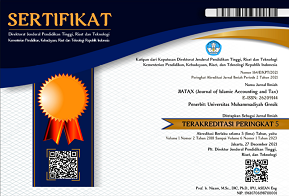Penganggaran Daerah: Dinamika Politik Menuju Konsensus
DOI:
https://doi.org/10.30587/jiatax.v1i2.1026Keywords:
budget politics, consensus, theory of communicative actionAbstract
This study aims to find out how the political process in preparing the budget carried out by local government institutions in reaching consensus. Budget politics is interpreted as an effort made by the actors (legislative and executive) to fight for the interests of the community. However, the implementation of budget discussions that produce budget legitimacy is still of a formal legal nature. The study was conducted using a critical paradigm approach with the analysis tool of Habermas the theory of communicative action.
This theory emphasizes the realization of mutual communication over each other's consciousness without any pressure from any party. So that the communication model that is built is dialogic to achieve mutual understanding. To achieve effective communication, it must fulfill claims of validity consisting of comprehensibility, truth, sincerity, and rightness. Data collection techniques using the method of observation, in-depth interviews, and documentation. In the view of Habermas the theory of communicative action, the rationality that guides the actions of the actors is instrumental rationality and target (strategic) rationality. Weaknesses in the validity of honesty claims have implications for the quality of consensus that is not good so it does not show a budget based on communicative rationality





.png)






